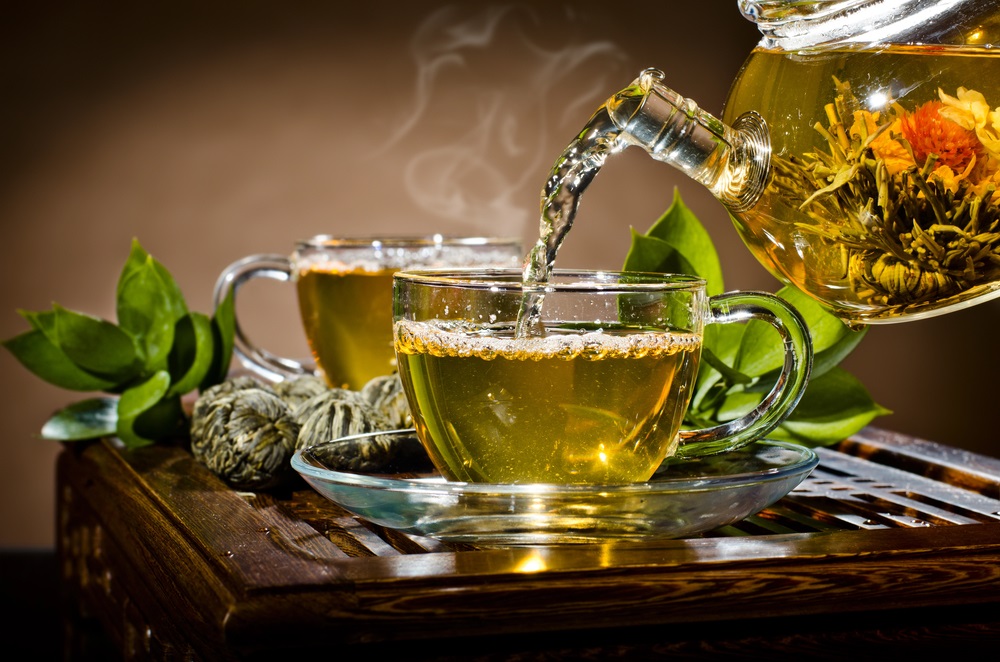
Green tea is a drink with a long history, which owes its origins to Chinese and Japanese culture. Over time, it has gained popularity all over the world – not only because of its taste, but also because of its health properties. In recent years, more and more people are reaching for it as an alternative to coffee. The reason? It has a stimulating effect, but does not cause the same side effects as caffeine in espresso. But does green tea have caffeine? And if so – how much caffeine is in a green tea?
Is there caffeine in green tea?
Depending on the type of tea, the conditions of cultivation and the method of preparation, the amount of caffeine may vary. Green tea also contains L-theanine, an amino acid with a relaxing effect. It is this that softens the stimulating effects of caffeine and provides a gentle effect of focus without irritability.
What is in a green tea shot?
Nowadays, the idea has been transformed into a health drink that contains real green tea, lemon juice, honey, and sometimes ginger.
How much caffeine does green tea have?
Caffeine in tea occurs naturally – it is present in both black and green tea. In the case of green tea, its content is usually lower – on average from 20 to 40 mg per cup. This is less than in coffee (80–120 mg), but enough to feel a mild stimulation.
What factors affect the amount of caffeine in green tea?
How much caffeine is in green tea? What does it depend on?
· Type of leaves – younger leaves usually contain more caffeine.
· Brewing time – the longer you brew the tea, the more caffeine goes into the infusion.
· Water temperature – higher temperature increases caffeine extraction.
· Type of tea – matcha, which contains powdered whole leaves, has significantly more caffeine than traditional green tea brewed from leaves.
Check, how to prepare matcha powder.
Benefits of drinking green tea with caffeine
The caffeine in green tea can have a positive effect on the body if we drink it sensibly. It supports cognitive functions, helps increase energy levels and can improve mood. When combined with L-theanine, it works longer and more steadily than coffee.
Green tea:
· improves concentration,
· stimulates without the effect of nervousness,
· supports fat metabolism,
· has antioxidant properties,
· relieves oxidative stress.
Physically active people can also reach for products that contain caffeine and green tea extract, such as Hyde Nightmare – a lemon pre-workout from Pro Supps, which combines an intense energy effect with additives supporting endurance.
Green tea and weight loss
Many dietitians recommend green tea as an element of a diet supporting weight loss. Thanks to caffeine and catechins (especially EGCG), it can accelerate metabolism, support fat burning and improve exercise results. However, it is not a miracle cure – the most important thing is diet and physical activity. People who are looking for teas that support weight control can reach for Slim Green – green tea for weight loss. It contains natural ingredients that support metabolism.
When is the best time to drink green tea?
Green tea works best during the day – in the morning or early afternoon. Drinking it before bedtime can make it harder to fall asleep, especially if we choose teas with a higher caffeine content. It is worth remembering that matcha, which is rich in caffeine, will be more intensely stimulating than classic loose-leaf tea. An example of classic green tea is Green Tea BIO – Gifts of Nature, which is suitable for everyday drinking without the risk of too strong stimulation.
Taste, aroma and additives – or how not to get bored with a cup and how to make green tea?
Green tea does not always have to be the same. Many available blends are a combination of classic tea with fruits, herbs and natural aromas. It is not only a matter of taste, but also of effect. For example:
· Green tea with lemon – great for refreshment.
· Green tea with orange blossom – delicate and relaxing.
· White herbal tea with lemon and bergamot – subtle, but with an energy effect.
The variability of taste and effect means that green tea can accompany you throughout the day – from stimulation to evening relaxation.
Does green tea contain caffeine? Summary
Green tea contains caffeine, but less than coffee and has a milder effect thanks to L-theanine. Let’s summarize!
· Green tea supports concentration, improves mood and supports metabolism.
· The amount of caffeine depends on the type of tea, brewing method and the presence of additives.
· It can be used as a daily drink or support in physical activity and diet.
· Example products: Green Tea Matcha Lemon Yogi Tea, Slim Green from Diet-Food, Organic Green Tea – Dary Natury.
Check also, how to make mint tea.

